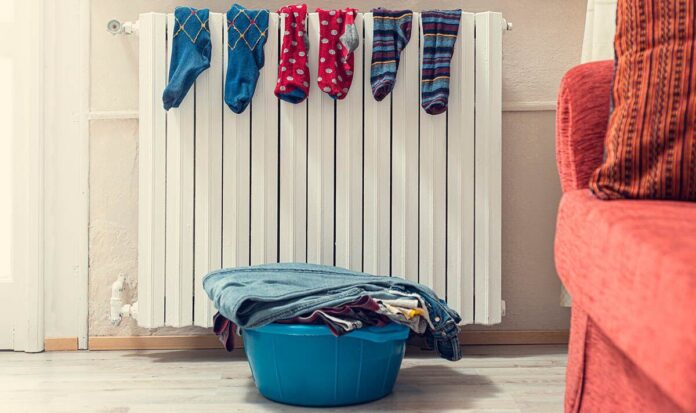Footing the bill for endless loads of laundry has become increasingly difficult for many households, particularly when drying bedding, towels and clothes. While avoiding tumble dryers and other heat sources is one way to minimise the cost of energy bills, an expert has warned against relying on “cheap”, heatless methods to dry wet items indoors. He explained that ditching “energy-hungry appliances” comes with its own long-term challenges, such as mould and dampness around the house.Chris Michael, home air treatment expert and managing director of Meaco said: “With more challenges arising from the increased cost of living and a jump in the electricity unit price, there is a wealth of advice available to households around how to save money.”While much of this advice offers valid alternatives to running energy-hungry appliances in the home, not enough of it considers the challenges that many of these alternatives will present to consumers in the medium to long-term.”He shared the most common laundry “myths”, and the best alternatives to dry laundry indoors.Drying laundry naturally is the cheapest optionWhile the annual running cost of a tumble dryer can seem steep, Chris explained that spending around £2 per load is often better than drying clothes on a radiator, airer, or on the back of chairs. READ MORE: Property pros claim ‘we’re not going to see a crash’ in new prediction ‘Clothes will not dry!’ Worst heatless laundry drying hacks that ‘waste energy and money’ (Image: GETTY) Drying clothes indoors is unavoidable in winter (Image: Getty)He said: “These options will be fine initially, but many don’t realise that it can introduce problems and incur additional costs over time.””The moisture released by the clothes as they dry will stay in the air, meaning that wet washing will take increasingly longer to dry – especially as households may keep windows closed to keep precious heat in. Increasing moisture in the room’s air can cause condensation and mould issues.”Watery residue on windows, a musty smell and damage to wallpaper or other nearby surfaces are all signs of excess moisture in the air, which can be expensive to fix.According to Chris, drying clothes naturally can make heating less effective too. He said: “Eventually the room itself will become so damp that the clothes will not dry and will have to be rewashed because they have started to smell.DON’T MISS:Easy method to banish ‘hazardous bacteria’ lurking in your showerhead [REVEAL]’Ideal’ bird feed ingredients to give wildlife ‘energy and strength’ [LATEST]Four early signs of mould in your bedroom – how to control it [INSIGHT] Leaving the window open only works if the outside temperature is colder outdoors (Image: Getty)Trapping warm air indoors without contributing to excess moisture can be solved by using a dehumidifier, though many households view this as an expensive investment.Chris noted that while some models can be costly, using one capped at 150-200 Watts costs the equivalent of just 5-6p per hour based on the October price cap rates.For a small expense, he recommended using one for the long-term benefits around the house. Chris said: “A dehumidifier will not only dry washing, but it will also protect the whole house from dampness and condensation problems and one with a HEPA filter will also clean the air.”As dry air is cheaper to heat than damp air, a dehumidifier will help households save on heating bills. The energy it uses will also heat the space, so there are many gains.”


